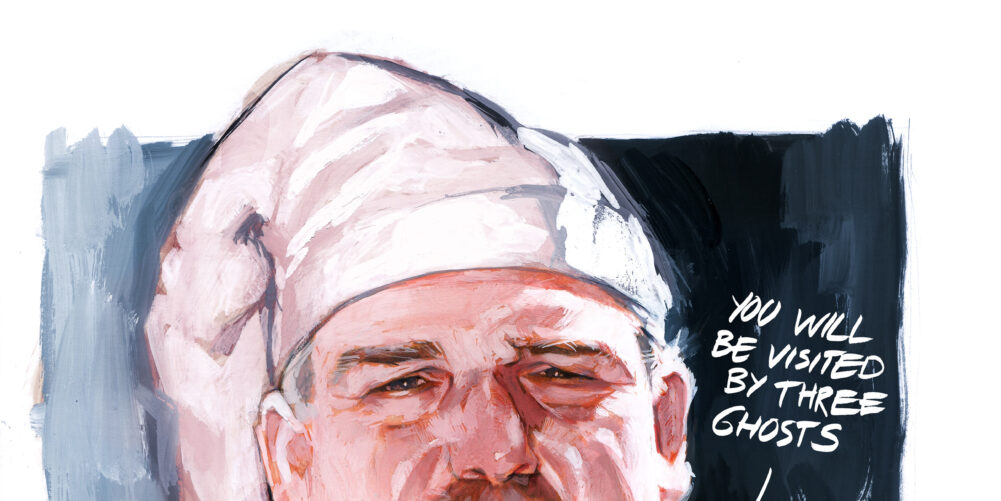When it comes to the Ashes, it is not uncommon for both countries to turn to dry humour in times of crisis, and one of the wittier Australian crowd banners when their team was getting a rare beating at home read: “Hide The Ashes Under A Bar Of Soap”. Australians regarding the relationship between personal hygiene and your average Pom is tenuous at best.
However, the safety valve of mocking yourself in times of trouble, rather than the opposition, remains an essentially British trait. Hence, when England were getting a hiding in the 1989 series, Private Eye joined in the general mickey taking, and underneath the political slogan “Thatcher Out!” painted on a wall outside the Oval, someone had added: “lbw Alderman 0.”
Not entirely surprising, then, when England arrived in Brisbane for the first Test of the 1986-87 series with a team which barely looked capable of giving the Toowoomba Girl Guides a decent game, that amongst all the doom and gloom one of the newspaper hacks managed to introduce a rare note of optimism. Namely, that England were clueless in only three departments, and if you took batting bowling and fielding out of the equation, they definitely had a chance.
It’s the 30th anniversary, almost to the day, of the opening Test of the ‘Can’t Bat, Can’t Bowl and Can’t Field’ series, and yet the captain of that team is still harping back to a throwaway line which perhaps, with hindsight, I should have thrown away. “It did irk some of us,” said Mike Gatting in an article in the Cricketer magazine, as though the pea-brained English Press corps had somehow failed to cotton on to the fact that the sheer incompetence of his team in the build-up was actually all part of a cunning plan to lull the enemy into a sense of false security.
In the same article, Gatt went on to claim that one newspaper had “flown in a couple of girls to try to get a sex story”, without apparently pausing to consider why the un-named newspaper in question should go to all that expense when there was not exactly a shortage of females in Australia. Which suggests that his memory in this area may be as hazy as in recalling quite how bad his team were in the build-up to that series.
A build-up, by the way, that would be unimaginable nowadays, spanning no fewer than 36 days from touching down in Australia to the first Test at the Gabba. Plenty of time, therefore, for them to fly thousands of miles criss-crossing the country in their mission to convince their hosts that they really were as useless as they appeared to be.
The Australian media had more than enough ammo to get stuck in, and one of their newspapers gleefully printed the “Can’t Bat” quote back, along with all the other uncomplimentary articles coming out of England, under the headline: “Latest On Pathetic Poms! See Page 13.”
They also spent a lot of time poking fun at the decision to make net practice optional for the senior members of the party – the “senior” being interpreted as the “easily bored” club made up of Gower, Botham and Lamb. Botham occasionally turned up for a bat, or more accurately a slog as he amused himself by targeting English journalists wandering around the outfield, but Gower was rarely spotted. His aversion to practice days was akin to one of those medical conditions, with a latin name like “nettus allergius”.
Which wouldn’t have mattered so much if Gower had looked like a man who didn’t need the practice, making three of the tourists’ 16 first-class ducks in the lead up to Brisbane. In the match immediately before the first Test, against Western Australia, Gower played and missed six times in an over from a bowler by the name of Ken MacLeay, who was nowhere near a place in the Australian Test side.
MacLeay was unusual in that he took wickets against England bowling right handed, whereas in all three of the state matches, England’s batsmen were bowled out by a succession of left handers that hardly anyone had heard of. Tazelaar and Frei for Queensland, Parkinson and Gladigau for South Australia, and Chris Matthews for WA.
Wilf Slack, pencilled in to open with Chris Broad, couldn’t get a run, and eventually England promoted Bill Athey to replace him. Gatting moved up to No.3 to allow Gower to escape the new ball down at No.5, and worries about the batting resulted in Bruce French being replaced by an inferior wicketkeeper, but handier batsman, in Jack Richards.
And it worked. It might not have done had Gower not been dropped in the slips on 0 when England were a precarious 198-4 in Brisbane, but he went on to make a half century, and Botham played one of his greatest Test match innings, annihilating the-then inexperienced Merv Hughes en route to 138, to set up victory.
Australian morale took a nosedive, and the captain Allan Border imploded at the Press conference. “How do you feel AB?” asked the avuncular Australian agency man, whereupon AB, short on temper, and even shorter on syllables, went off like Krakatoa.
The relationship between the England players and the travelling Press corps was actually pretty good, and when the team arrived in the coastal town of Newcastle for the next match against New South Wales, the players wore T-shirts imprinted with “Can’t Bat”, “Can’t Bowl” and “Can’t Field” slogans. Whereupon the Press responded with “As we were saying before Brisbane” T-shirts when England, bowled out for 197 and 82, lost the match in just over two days.
There was a Christmas Day panto, written by the Press and attended by all the players, in which Gatting (for who a failed alarm call led to a late enough appearance for the Victoria game for Gower having to conduct the toss) was visited in his bed by the ghosts of ‘Can’t Bat’, ‘Can’t Bowl’ and ‘Can’t Field’, and the Australian media giving up on humour when they lost the Ashes in the Boxing Day Test.
In fact, they gave up on the team full stop. Switching to Pat Cash winning the Davis Cup for Australia, and ignoring the cricket altogether. When it was all over, Gatting suggested that the ‘Can’t Bat’ business had provided his team with all the incentive it needed, in which case – especially as that tour provided him with the only two Tests he won in 23 outings as captain – would it be impolite to ask, three decades on, if Chris Broad would return his Man of the Series award to its rightful owner?
This piece originally featured in The Cricket Paper, November 11 2016
Subscribe to the digital edition of The Cricket Paper here












